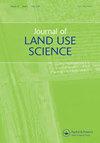可持续发展认证能否增强小农的气候适应能力?加纳可可的案例
IF 3.3
4区 环境科学与生态学
Q1 AGRICULTURE, MULTIDISCIPLINARY
引用次数: 4
摘要
可持续性认证被认为是提高小农气候适应能力的关键治理机制。虽然许多认证现在将气候适应能力纳入其标准,但它们为小农提供气候适应能力的能力仍未经检验。我们以2015-16年加纳的干旱冲击对可可生产的影响为例,研究认证是否可以提高小农的气候适应能力。我们使用了一种新的跨学科方法,将参与性结果定义与家庭调查、生物物理测量、卫星数据和反事实分析相结合。利用我们的气候适应能力框架,我们发现认证对采用基本管理(如施肥)有很强的影响,但对更复杂的适应能力策略(如农林业多样化)的影响较弱。除了认证之外,我们还确定了韧性方面的强大区域模式。这些发现表明,认证在增强气候适应能力方面具有一定的潜力,但要提高有效性,需要更加注重促进多样化和适应地方情况。本文章由计算机程序翻译,如有差异,请以英文原文为准。
Can sustainability certification enhance the climate resilience of smallholder farmers? The case of Ghanaian cocoa
ABSTRACT Sustainability certification has been posited as a key governance mechanism to enhance the climate resilience of smallholder farmers. Whilst many certifications now include climate resilience in their standards, their ability to deliver this for smallholders remains untested. We take the case of the 2015–16 drought-shock to cocoa production in Ghana to examine whether certification can enhance smallholder climate resilience. We used a novel transdisciplinary methodology combining participatory outcome definition with household surveys, biophysical measurements, satellite data and counterfactual analysis. Utilising our climate resilience framework, we find that certification has a strong effect on the adoption of basic management, e.g. fertilization, but a weak influence on more complex resilience strategies, e.g. agroforest diversification. Beyond certification, we identify strong regional patterns in resilience. These findings suggest that certification has some potential to enhance climate resilience but greater focus on facilitating diversification and adapting to sub-national contexts is required for improved effectiveness.
求助全文
通过发布文献求助,成功后即可免费获取论文全文。
去求助
来源期刊

Journal of Land Use Science
Environmental Science-Management, Monitoring, Policy and Law
CiteScore
5.40
自引率
6.20%
发文量
26
期刊介绍:
The Journal of Land Use Science provides a central outlet for high-quality articles on theoretical and empirical aspects of land-use science at the interface of social and environmental systems. The Journal brings together an array of research perspectives at multiple temporal, spatial and social scales that contribute a better understanding of land-system dynamics and communicate scientific advances towards attaining land-system sustainability.
 求助内容:
求助内容: 应助结果提醒方式:
应助结果提醒方式:


